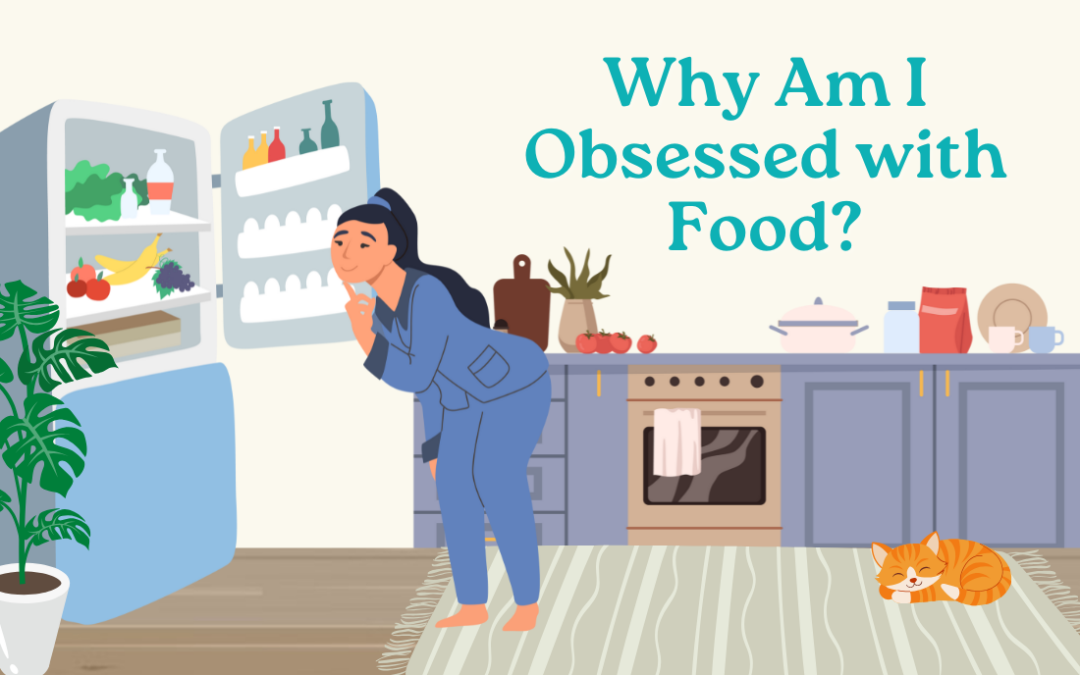Q: Why am I obsessed with food?
A: It’s easy to feel frustrated or confused when thoughts about eating seem to take over your mind, making it hard to focus on anything else.
Whether you’re restricting certain foods or dealing with emotional stress, a food obsession can feel overwhelming. In my experience as a health coach, the main reason people become obsessed with food is because of restriction.
There are two main types of food restrictions: physical (not eating enough or avoiding certain foods) and mental (labeling foods as “bad” or off-limits).
When you deprive yourself, you naturally fixate on what you’re missing.
Side note: The more you tell a child NOT to play with the pink stuffed dinosaur, the more they want to play with it! That’s us when it comes to food.
For a deeper look at food obsession and how to become a normal eater, keep reading this post!
Written by Jenn Hand, Holistic Nutritionist, Board Certified Health Coach, NBC-HWC
My Food Obsession Story
Most of my high school and college years were spent mentally consumed with food.
Food dominated almost every waking thought. I would meticulously plan every meal, count calories down to the last bite, and feel insane guilt if I strayed even slightly from my plan.
I’d spend hours researching “healthy” recipes, analyzing nutrition labels, and battling cravings for “forbidden” foods.
The more I tried to control what I ate, the more food seemed to control me.
I remember being on Semester at Sea (a study abroad program where I got to see countries all over the world) and planning how I was going to go for a run while I stood on the Great Wall of China. I had binged the night before and I wanted to “make up” for the binge eating.
The turning point came when I realized this cycle wasn’t sustainable. I was exhausted, unhappy, and missing out on life.
Slowly, I began challenging the rules I’d set for myself, learning to listen to my body, and allowing myself to eat foods I loved without judgment.
It wasn’t easy, but as I released the grip of restriction and obsession, I found a sense of freedom I never thought possible. That journey not only transformed my relationship with food but also inspired me to help others do the same.
Table of Contents
- How I Help My Coaching Clients Deal with Obsessive Food Thoughts
- What Even Is Food Obsession?
- What Typically Causes Food Obsession?
- Signs You’re Obsessed with Food
- Does Social Media and Diet Culture Impact Food Obsession?
- 7 Key Ways to Deal with Food Obsession and Become a Normal Eater
- Practical Ways to Manage Food Anxiety in Social Situations
- Why Restricting Foods Can Backfire
- Why We Overthink Food Choices
- Fear of Weight Gain and Food Obsession
- How Emotional Eating Plays a Role
- Why I Don’t Like Talking about “Eating Disorders”
- Your Journey to Food Freedom and Becoming a Normal Eater
- Food Obsession Q&A
How I Help My Coaching Clients Deal with Obsessive Food Thoughts
When I work with clients struggling with obsessive food thoughts, we focus on rooting out where they are restricting or feeling “diet-y.”
I help them identify and challenge restrictive food rules, tune into their body’s hunger and fullness signals, and explore emotional triggers that drive their preoccupation with food. It’s a process of unearthing fears and anxieties around food and guiding them to step outside of their comfort zone, bit by bit, so they gain trust in themselves around ALL foods.
What Even Is Food Obsession?
I think of food obsession as feeling like we are consumed 24/7 by thoughts of food.
It feels like an all day affair–an all-consuming preoccupation with eating, dieting, or controlling food. I used to obsess over what I should eat, wanted to eat, couldn’t eat. And then if I overeat, how to make up for it, what to restrict, and how I could exercise it off.
Food obsession can feel like food dominates your thoughts—planning meals, worrying about what you ate, or constantly craving certain foods. This mental fixation often takes the joy out of eating and leaves you feeling frustrated or overwhelmed–I know it did for me!
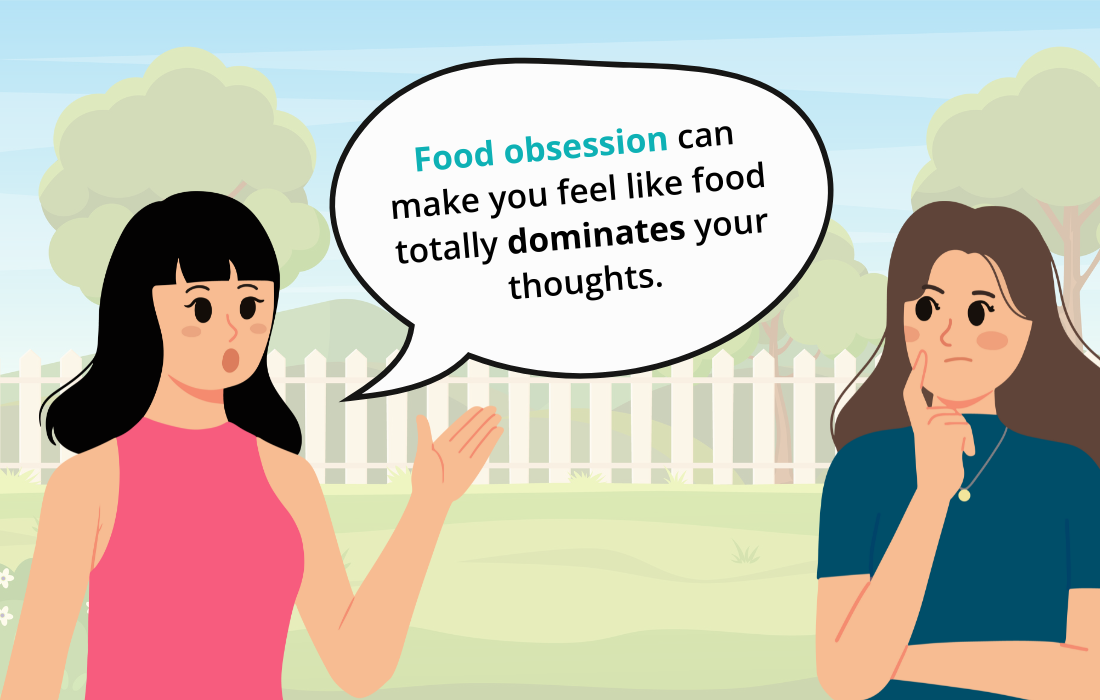
What Typically Causes Food Obsession?
One of the main drivers of this obsessive thinking is restriction, whether physical (not eating enough) or mental (labeling foods as “bad”).
Emotional triggers like stress, loneliness, or boredom can also play a role, as can societal pressures to look a certain way. When food becomes tied to control, guilt, or coping, it’s easy to spiral into obsessive thoughts.
Signs You’re Obsessed with Food
For me and the clients I’ve worked with, here are some telltale signs:
- You’re thinking 24/7 about what you’ll eat next (in an obsessive way, not in a “nourish my body” way)
- You say no to social gatherings or avoid social situations because of food worries or because you don’t want to eat or you ate too much the night before
- You plan your days around food rules or diets and get super anxious if you aren’t in your routine
- You struggle to stop eating once you start, especially with “off-limits” foods.
Does Social Media and Diet Culture Impact Food Obsession?
Social media and diet culture can definitely impact food obsession.
Social media and diet culture bombard us with unrealistic body ideals, conflicting nutrition advice, and messages that equate worth with weight. Scrolling through perfectly curated food photos or weight-loss tips can make you feel like you’re failing if you don’t meet those standards, fueling food obsession and self-doubt.
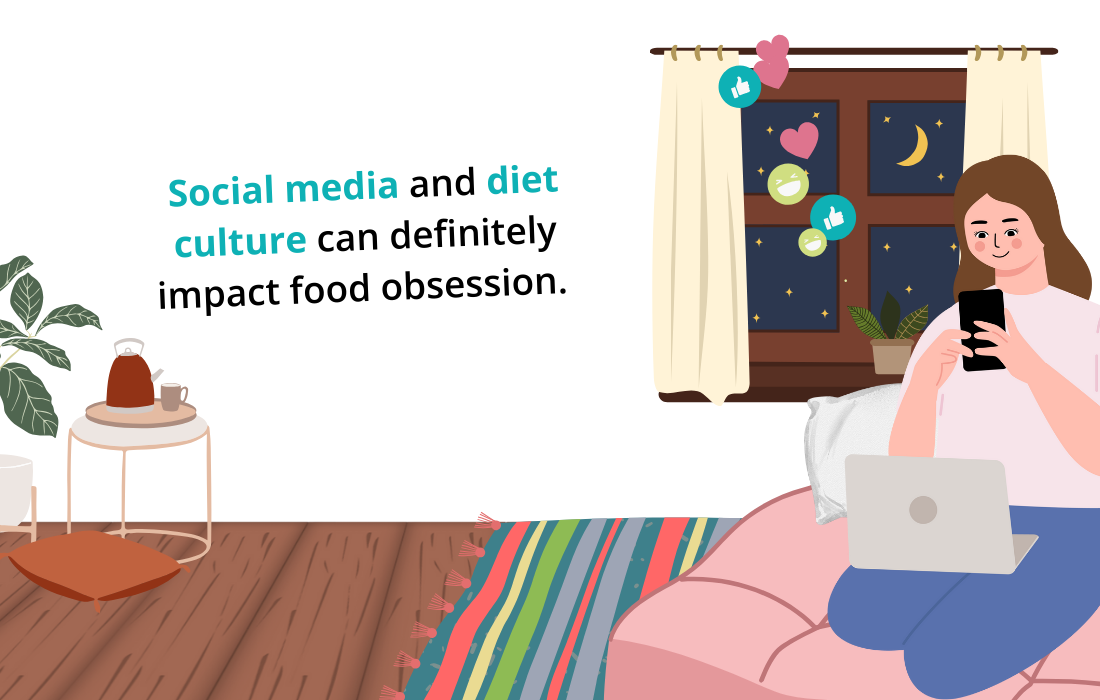
7 Key Ways to Deal with Food Obsession and Become a Normal Eater
1 – Work to break some food rules
Strict food rules create a sense of deprivation, which fuels obsession.
I had a list of a million food rules when I first began this journey: bread will make me fat, I can’t after 7pm, I’ll gain weight if I don’t eat perfectly, I shouldn’t have carbs, sugar is the devil, among A LOT of other ones!
We don’t break all of these rules at once, but it’s important to understand that softening the “good” and “bad” judgement of food allows you to eat without guilt or restriction.
This is so crucial because it removes the pressure and fear around eating, which takes the charge out of food. This is counterintuitive to what we think will “work” for us–we think the more we tightly restrict, the more control we have. But the opposite is really true! I’ve seen time and time again coaching women who are skeptical of this.
We start with breaking small rules and every time they are amazed that they think of food LESS when they allow MORE.
2 – Begin a conversation with your body
Dieting disconnects us from our body’s natural signals of hunger and fullness.
We operate on plans, rules, calorie count, grams or whatever other program we’re following. All diets come from a mind based way of eating. To begin to let go of obsession, we want to tap into more of a body based way of eating.
Begin by opening a conversation with your body–when is your energy highest? When does it dip? What does hunger feel like? What foods feel satisfying?
Rebuild trust by tuning into these the cues your body is giving you that help you learn how to eat in a balanced way. One of the best ways to do this is to use the clock as a guide to then begin to hear cures.
One of my clients found the 3-4 hour reminder to eat a very natural cadence, which allowed her to start to hear the subtle degrees of hunger and fullness. She used the clock to guide her at first.
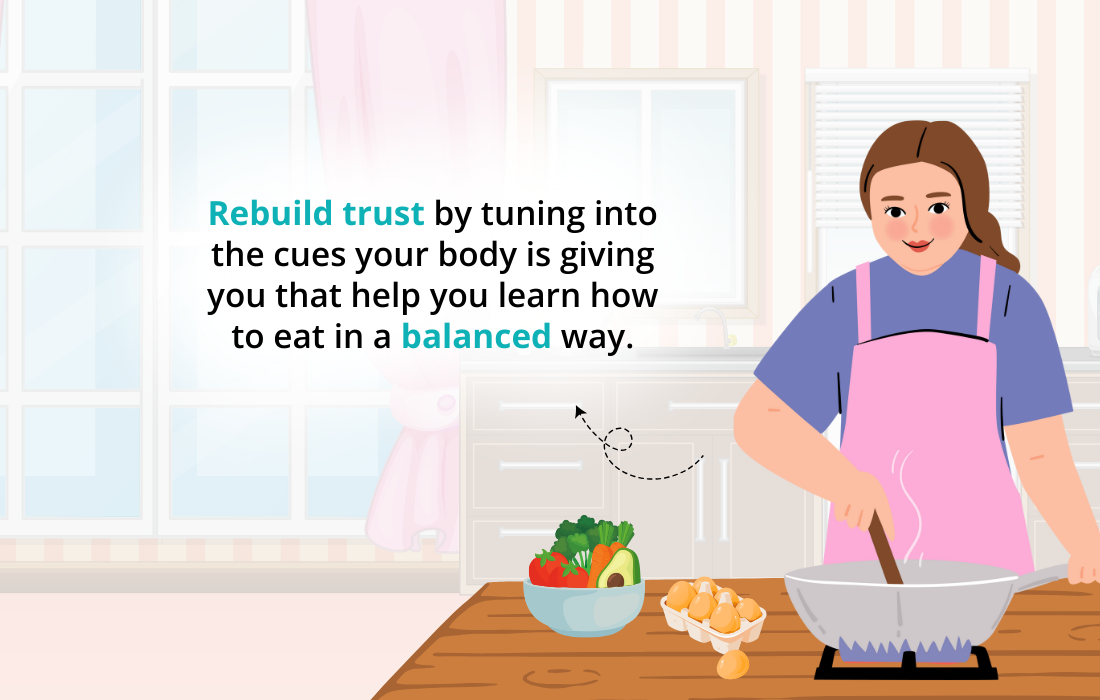
3 – Focus on health, not weight loss
Constantly focusing on weight loss reinforces a restrictive mindset and keeps us trapped in cycles of obsession.
The more we obsess over losing weight, the more our minds want to follow food rules and control what we eat. This always backfires! Instead, see if you can shift your focus to how different foods make you feel—energized, satisfied, sluggish, fueled, balanced or something in between.
This isn’t to say we can never think about weight.
But usually weight needs to be addressed a bit later in the journey, as we need to find balance and peace before we explore weight. And this means exploring weight not from the old diet way but from a new holistic way!
4 – Explore your emotional landscape
Thinking about food 24/7 can stem from using food to cope with emotions.
If we use food to soothe stress, deal with overwhelm, as a balm for boredom and a comfort for our anxieties, we’ll think about food a lot. That’s why learning to identify and address emotional triggers is so important–when we learn to process and handle feelings, we reduce our reliance on food.
One of my favorite client stories was about a woman named Sarah who battled eating at night while traveling. She would look forward to being in her hotel room alone at night so she could binge.
Once we discovered that this nighttime snacking was tied to the deep loneliness she was feeling, we worked to create a plan to feel the feeling and her cravings significantly decreased.
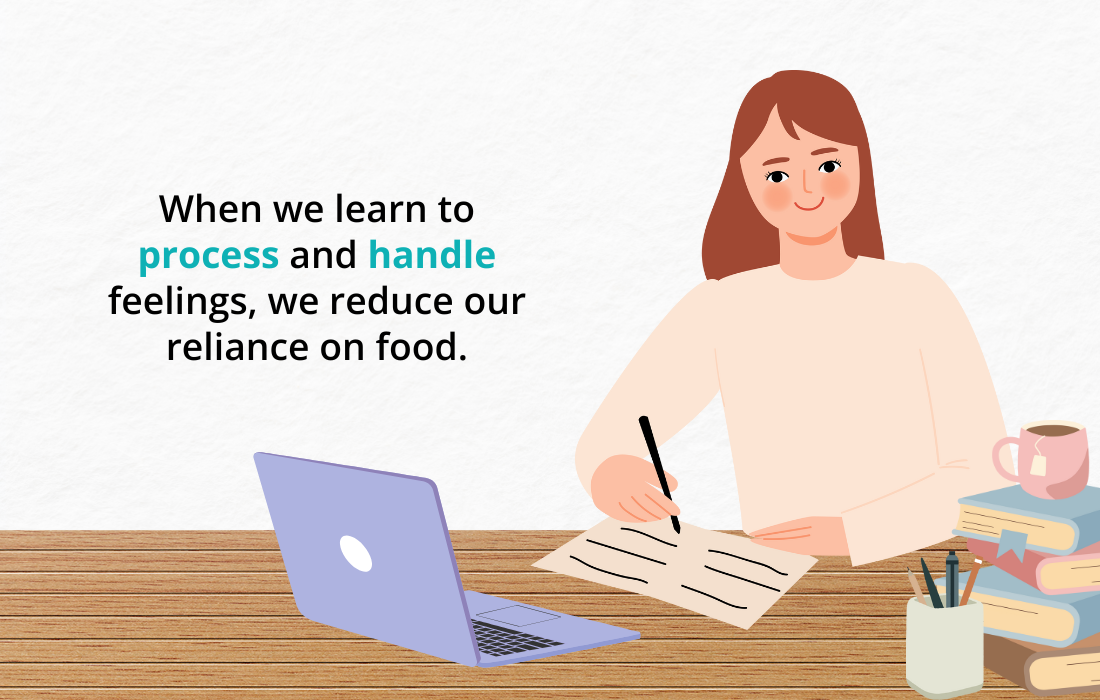
5 – Focus on adding in instead of cutting out
This was a big one on my own journey.
So much of my dieting was about removing something–cut out this food, take away that food. But when I flipped the script and began focusing on what I wanted to ADD instead of what I “shouldn’t” have, it helped me make food choices from a different place.
So instead of focusing on what you “shouldn’t” eat, think about what you can add to your meals—like different varieties, flavors, textures, colors or combinations of choices. This mindset helps shift your focus from scarcity to satisfaction.
6 – Reframe how you look at food
Instead of wanting to NOT think about food, can you shift the way you DO think about it?
We will be eating 3-4 times a day for the rest of our lives, so it’s impossible to NEVER think about food. But if we can shifting from viewing food as the enemy to seeing it as a source of nourishment, it can change your entire relationship with eating.
Can you look at food as a way of taking care of yourself?
Can you view your relationship to eating as a doorway into a deeper relationship to your own needs, preferences and desires?
If we don’t know what we want to eat for dinner, how can we know what we want to do in life? Our food struggle is the doorway into so much more and it’s worth working to reframe it to see if we can be open to learning how to take care of ourselves!
Read More: How to Figure Out What to Eat So You Feel Satisfied
7 – Get extra support
Whether it’s a book, an online program, a coach, a mentor, a free support group or something else that resonates, seek support in this journey.
We can’t go at it alone. For me, this was a game-changer and working 1:1 with someone changed the course of my life. When we’re stuck with the swirling chaos inside our own minds, we often have a hard time gaining clarity about what it is we really need.
Breaking free from food obsession isn’t always easy to do alone and is worth getting extra support to help us heal and find freedom.
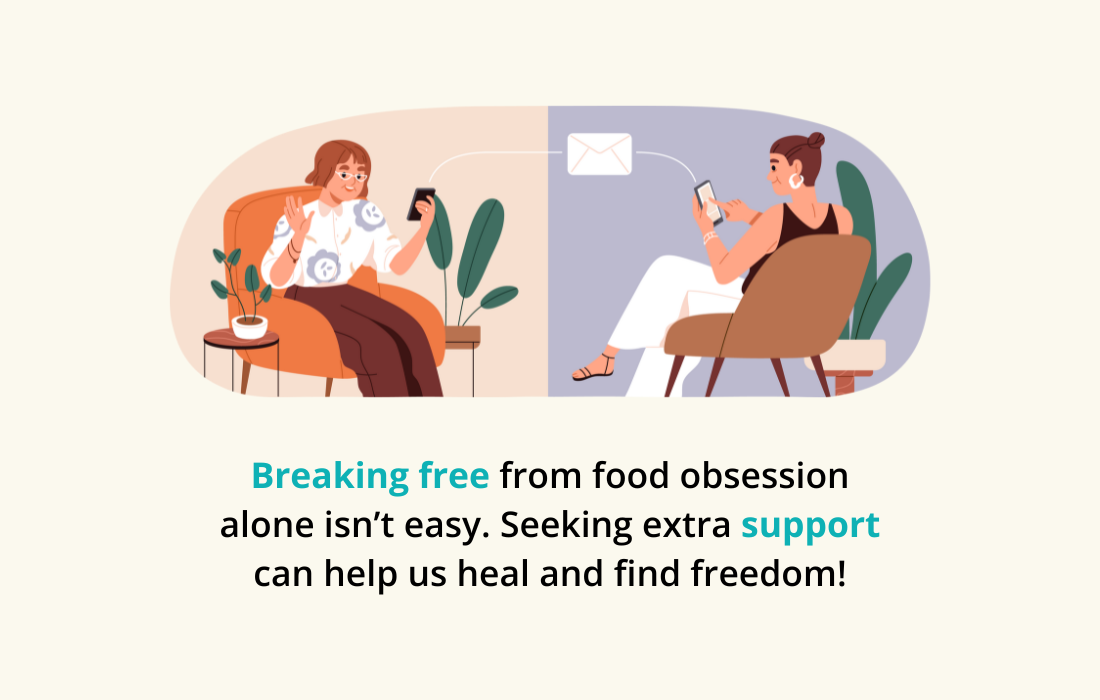
Practical Ways to Manage Food Anxiety in Social Situations
One of my favorite mantras in social situations was shifting from “don’t eat that, don’t eat that, don’t eat that” to “eat balanced, eat balanced, eat balanced.”
This helped me refocus from my mind’s obsessive rules to what I wanted to eat to feel balanced and nourished. See if you can focus on staying present in the moment and grounding yourself in your mind when your mind feels swirly with diet rules/thoughts.
I also always like to remind myself to put food on a plate and sit down and enjoy it!
When we’re grazing and picking while standing at a social gathering, it can be challenging to know when we’ve had enough. Plus sitting down allows you to pause, take a breath, and enjoy the food and environment!
Why Restricting Foods Can Backfire
Don’t think of a pink elephant!!!!
Now, what did you just think of?! A pink elephant!
The more we tell ourselves “don’t eat that bread!” the more we want to eat the bread. Rigid food rules creates a sense of scarcity, which makes us immediately crave the forbidden foods more intensely. Over time, this often leads to bingeing or overeating the very foods we’re trying to avoid.
Allowing all foods into your diet without guilt helps reduce the power they hold over you.
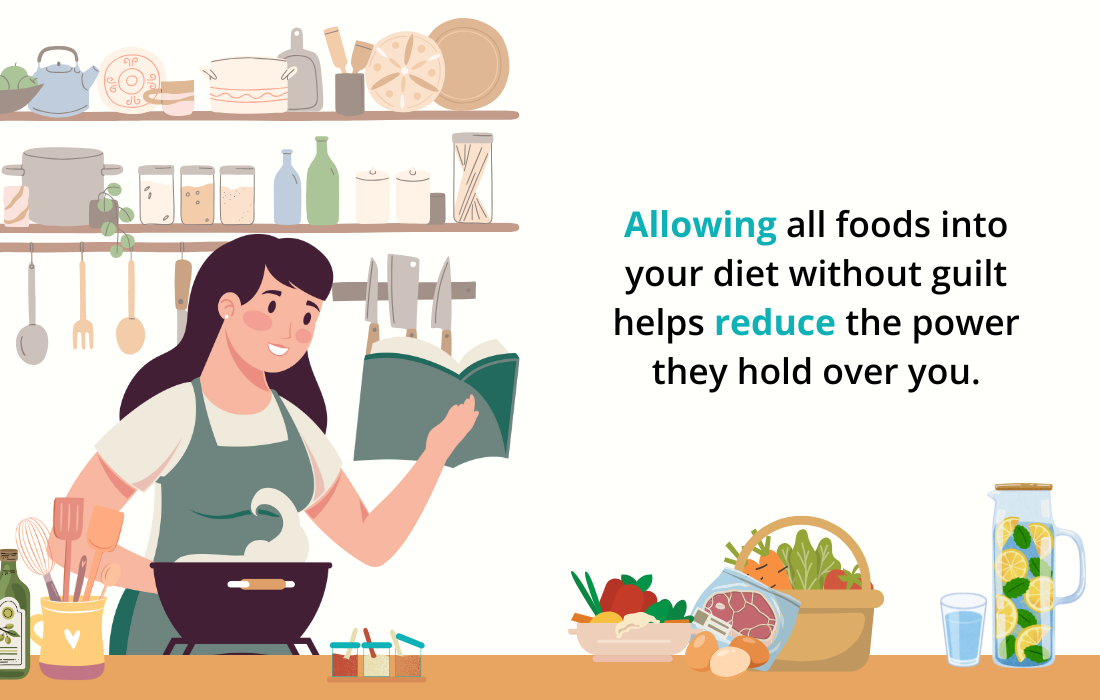
Why We Overthink Food Choices
Admittedly, I still do this sometimes.
And it’s usually when I order what I think I should vs what I actually want! We can also overthink food because we’ve been conditioned to believe there’s a “right” and “wrong” way to eat. Diet culture and conflicting nutrition advice create confusion and fear, making simple choices feel overwhelming.
But in reality, there is no one “perfect” way of eating. This path is all about learning what works for us and our own unique bodies! The best remedy to overthinking is to pick something (anything) and get the feedback to keep learning about what works for you.
Fear of Weight Gain and Food Obsession
This is a fear of every single woman I work with and was a fear that plagued me for many years.
When we are terrified of weight gain, we try to rigidly control our eating to maintain or lose weight. Shifting your focus to how you feel—physically and emotionally—rather than the number on the scale can help ease this fear.
What helps the most to let go of fear is nudging yourself outside your comfort zone bit by bit and then gaining trust through your own experience that you CAN eat a meal with a cookie and not immediately gain 10 pounds.
It’s baby steps of letting go of fear bit by bit as we move forward on the journey.
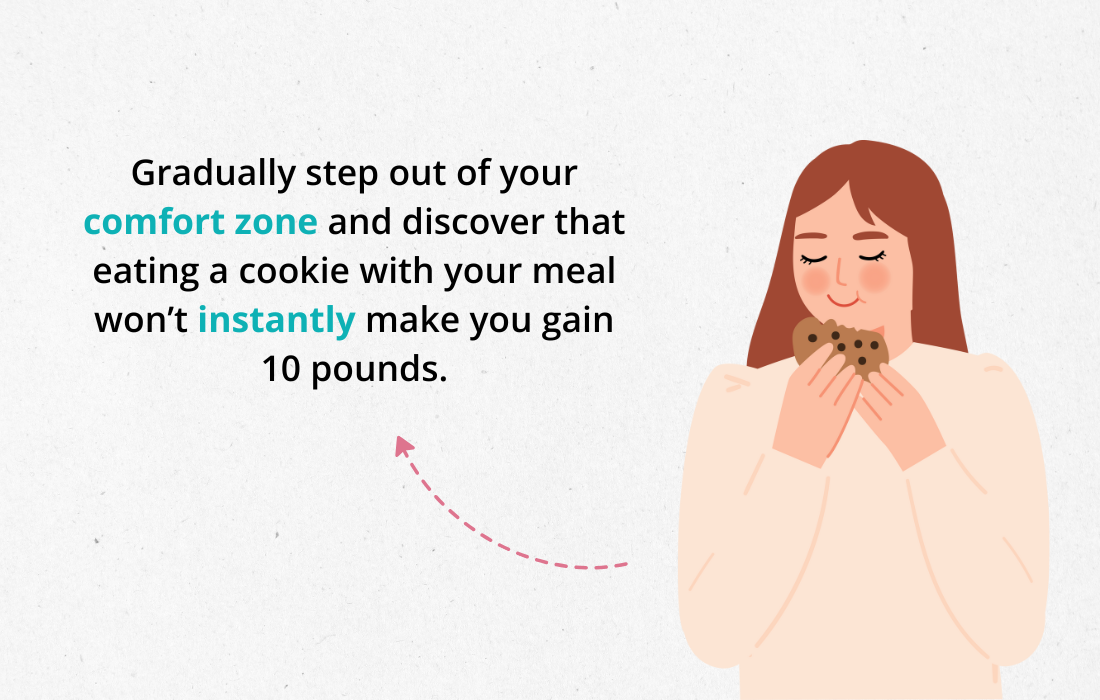
How Emotional Eating Plays a Role
Emotional eating often happens when we use food to numb or distract from feelings like stress, sadness, or boredom.
It’s important to recognize that emotional eating isn’t inherently “bad” but rather a sign that your emotional needs might not be met. Explore healthier coping mechanisms can reduce the role food plays in managing emotions–my favorites are journaling, meditation, breathwork, and EFT.
Why I Don’t Like Talking about “Eating Disorders”
I’m not big on labels because I think they can keep us stuck.
The term “eating disorder” can feel limiting and may not capture the full spectrum of food struggles people face. Many women don’t fit neatly into a diagnosis but still experience significant challenges with food.
I like to think of what I do as helping people heal their relationship with food, regardless of whether they meet a clinical definition!
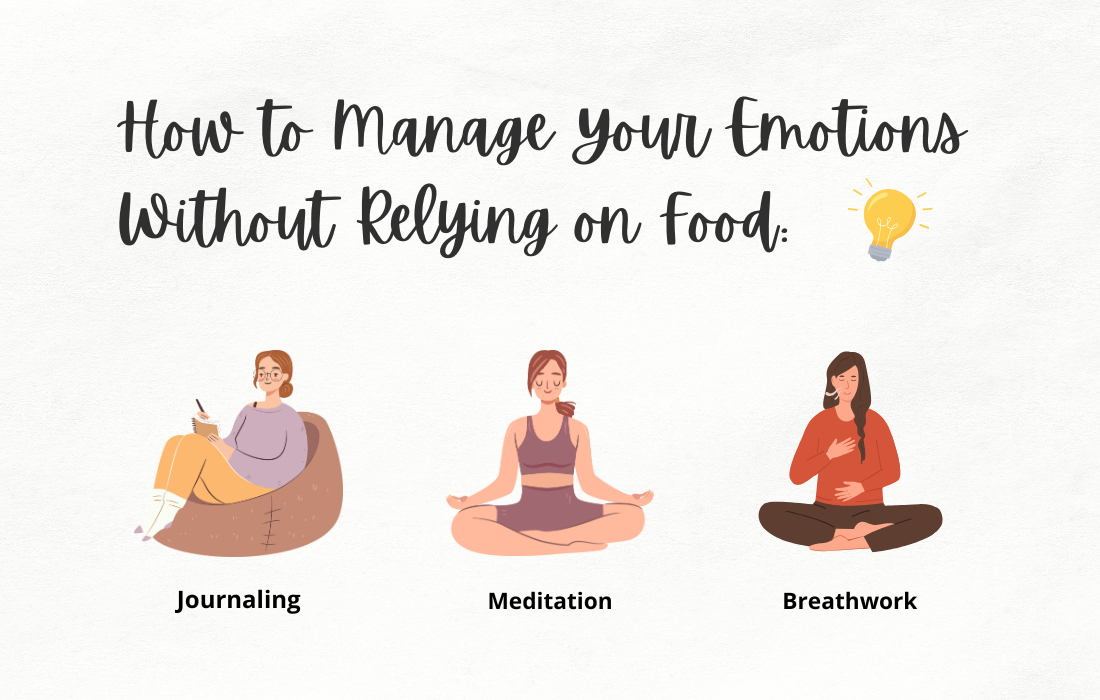
Your Journey to Food Freedom and Becoming a Normal Eater
Food freedom isn’t about perfection or following rigid rules—it’s about creating a life where food feels easy, nourishing, and joyful.
It’s a journey of small steps that add up to big wins. Every small step you take toward letting go of food obsession brings you closer to feeling that peace. If you are here, then there is some tiny spark in you that feels hope around becoming a normal eater.
That was what kept me going on the darkest parts of my own struggle. I wanted to live my life free from obsession and even though I had many doubts, I stayed the course.
I see that same path for you because I truly believe food freedom is possible. 💛
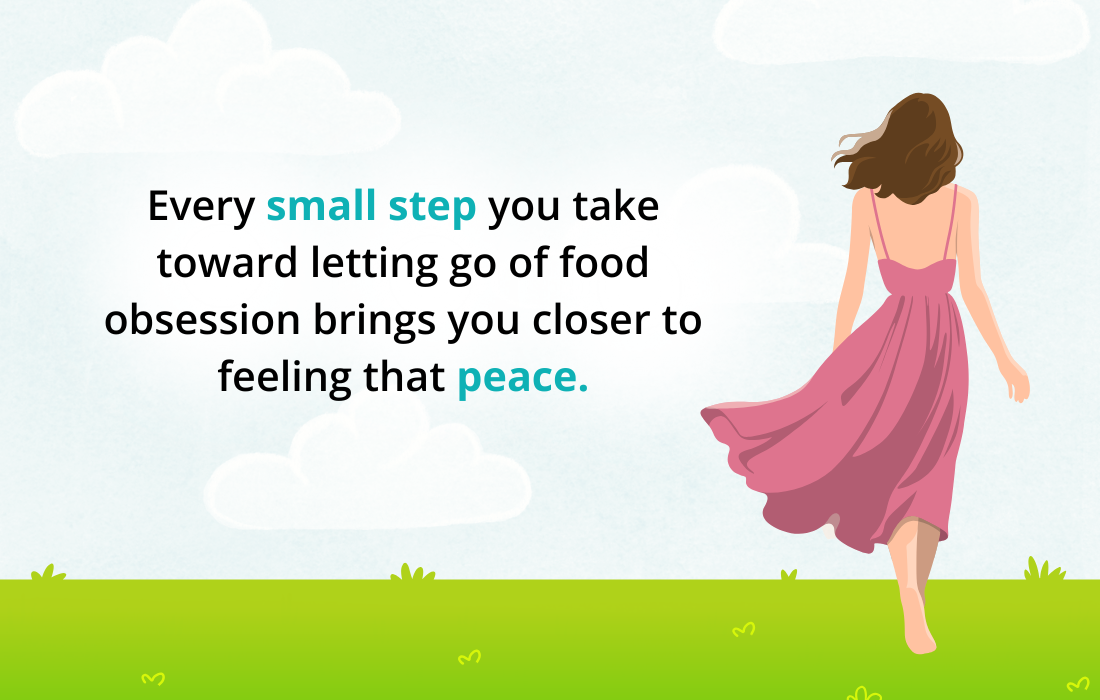
Food Obsession Q&A
What is a diet mentality?
I like to refer to the diet mentality is the “old tapes”–it’s a mindset we learned while being in the diet world that focuses on restriction, rules, and control around food, often tied to weight loss and “good” or “bad” eating.
It can fuel food obsession by making you feel deprived and overly focused on what you “should” eat.
Will intuitive eating help with food obsession?
Yes, intuitive eating helps break the cycle of food obsession by teaching you to trust your body’s signals and let go of restrictive rules, creating a more peaceful and natural relationship with food.
Can food rules cause a food obsession?
Yes! In my own food battle, the more rules I tried to adhere to, the more obsessed I became around food. Rigid rules often lead to feelings of deprivation, which can increase cravings and make you hyper-focused on food.
Does diet culture contribute to food obsession?
Yes, diet culture promotes unrealistic body ideals and restrictive eating patterns, which can make you feel like you’re constantly battling with food and your body.
What are some examples of positive eating habits?
Having a positive relationship to food includes habits like listening to your body, honoring your hunger, letting go of “good and bad” foods, and allowing yourself to eat meals without judgment or guilt.
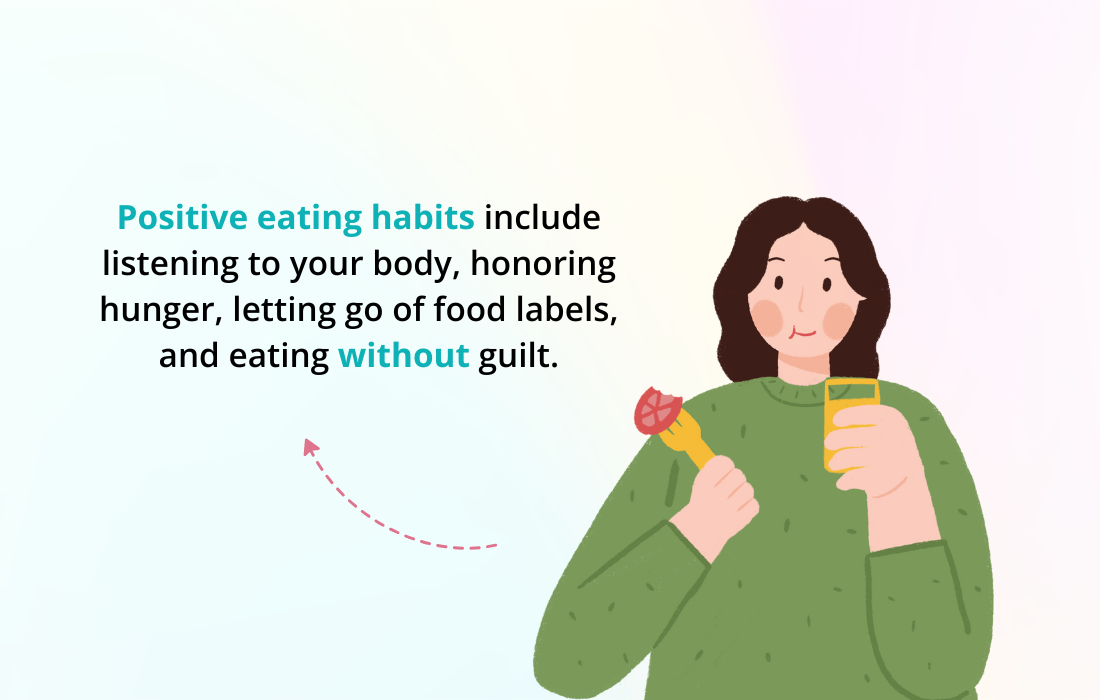
Is food addiction a real thing?
While some people feel addicted to food, research suggests this “addiction” often stems from restriction and emotional triggers rather than food itself. I’m a believer that what we call “addiction” can be overcome!
What are some examples of food obsessions?
When I was obsessive about food, I thought about it all day–I’d plan what I’d eat, how to make up for a binge, or how to exercise off what I ate during the day. Others include constantly thinking about your next meal, calorie counting, and feeling guilty about eating certain foods.
How can I tell if I have “disordered eating”?
Signs of disordered eating include preoccupation with food, rigid food rules, skipping meals, and using food to cope with emotions.
What are some common obsessive food thoughts?
Obsessive food thoughts can include planning meals in great detail, worrying about calorie intake, and constantly evaluating if you’ve “earned” a meal.
Should I work with a Certified Intuitive Eating Counselor or food coach?
If you need extra support, I highly recommend it! Working with a Certified Intuitive Eating Counselor or food coach can provide guidance and support as you navigate your food struggles and build healthier habits. 1:1 support can be a wonderful way to get where you want to go “faster.”
What is the best way to lose weight if you’re dealing with obsessive food thoughts?
Instead of focusing on weight loss, shift your focus to healing your relationship with food. As you address obsessive thoughts, your body can naturally settle at a healthy weight for you. I like to recommend that women focus on “health” vs “losing weight.”
How can I tell if I’ve eaten enough food at a meal?
Pay attention to your body’s signals, like feeling satisfied, energized, and no longer hungry. Eating slowly and checking in with yourself can help you recognize when you’ve had enough. turpis. Fusce elementum ex nec auctor dictum.
Related Articles
⚪ How to Figure Out What to Eat
⚪ How Can Anger Affect Eating Habits?
⚪ What Is Holistic Weight Loss?
⚪ Can I Eat Whatever I Want and Still Lose Weight?
Get the Normal Eater’s Newsletter
Join 8000+ women who are overcoming overeating, binge eating, and breaking up with dieting forever. Get Jenn’s inspiring and actionable weekly newsletter with the latest posts, podcasts, and tips on how to love your body, find food freedom, and lose weight holistically.
Get the Normal Eater’s NewsletterWork with an Emotional Eating & Holistic Nutrition Coach
Overcome Bingeing and Emotional Eating and Break Up with Yo-yo Dieting
Working with an emotional eating coach and holistic nutritionist can help you get free from the frustrating binge and restrict cycle and stop yo-yo dieting.
You don’t have to be obsessed with food or have a million rules around eating to find your natural weight and learn to love your body. Ready to actually see a lasting change and experience true freedom?
Schedule a 20-min CallAbout the Author:

Jenn Hand has been helping women like you become normal eaters since 2015.
She’s worked with thousands of women, helping them to balance their bodies, end bingeing, stop obsessing over food, and start feeling amazing again. As a board-certified health coach and holistic nutritionist, Jenn knows how to support you in making real positive changes that last.
Her articles have been published on Mind Body Green, Tiny Buddha, Thrive Global and other local and global media platforms. She’s the author of How to Be a Normal Eater and the creator of The Normal Eater’s Club program. Listen to Jenn’s advice and tips on the Cake Doesn’t Count Podcast, or read more of her articles for free on the Food Freedom Blog.
Learn About Coaching!
